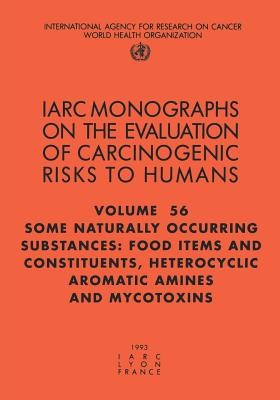
- We will send in 10–14 business days.
- Author: The International Agency for Research on Cancer
- Publisher: World Health Organization
- ISBN-10: 9283212568
- ISBN-13: 9789283212560
- Format: 17.8 x 25.4 x 3.2 cm, minkšti viršeliai
- Language: English
- SAVE -10% with code: EXTRA
Some Naturally Occurring Substances (e-book) (used book) | bookbook.eu
Reviews
Description
Evaluates the carcinogenic risk to humans posed by the ingestion of several naturally occurring substances. Separate monographs are presented for two food items (salted fish and pickled vegetables), two naturally occurring plant substances (caffeic acid and d-limonene), four heterocyclic aromatic amines found in cooked meat and fish, and selected mycotoxins, including aflatoxins.
The monograph on salted fish concentrates on fish as traditionally prepared in southern China, where very high rates of nasopharyngeal carcinoma have been linked to the consumption of salted fish prepared in a manner which involves putrefaction. The monograph concludes that Chinese-style salted fish is carcinogenic to humans. The second monograph concludes that pickled vegetables prepared according to traditional Asian methods are possibly carcinogenic to humans. Caffeic acid was judged to be possibly carcinogenic to humans. The report was unable to classify the carcinogenicity of d-limonene. For the heterocyclic aromatic amines present in cooked meat and fish, IQ was classified as probably carcinogenic to humans; MeIQ MeIQx and PhIP were classified as possibly carcinogenic.
The most extensive monograph on aflatoxins concludes that naturally occurring mixtures of aflatoxins are carcinogenic to humans and that aflatoxin M1 occurring in milk is possibly carcinogenic. Toxins derived from Fusarium moniliforme and ochratoxin A, which has been linked to Balkan endemic nephropathy, were classified as possibly carcinogenic to humans. The remaining mycotoxins could not be classified.
EXTRA 10 % discount with code: EXTRA
The promotion ends in 21d.22:34:31
The discount code is valid when purchasing from 10 €. Discounts do not stack.
- Author: The International Agency for Research on Cancer
- Publisher: World Health Organization
- ISBN-10: 9283212568
- ISBN-13: 9789283212560
- Format: 17.8 x 25.4 x 3.2 cm, minkšti viršeliai
- Language: English English
Evaluates the carcinogenic risk to humans posed by the ingestion of several naturally occurring substances. Separate monographs are presented for two food items (salted fish and pickled vegetables), two naturally occurring plant substances (caffeic acid and d-limonene), four heterocyclic aromatic amines found in cooked meat and fish, and selected mycotoxins, including aflatoxins.
The monograph on salted fish concentrates on fish as traditionally prepared in southern China, where very high rates of nasopharyngeal carcinoma have been linked to the consumption of salted fish prepared in a manner which involves putrefaction. The monograph concludes that Chinese-style salted fish is carcinogenic to humans. The second monograph concludes that pickled vegetables prepared according to traditional Asian methods are possibly carcinogenic to humans. Caffeic acid was judged to be possibly carcinogenic to humans. The report was unable to classify the carcinogenicity of d-limonene. For the heterocyclic aromatic amines present in cooked meat and fish, IQ was classified as probably carcinogenic to humans; MeIQ MeIQx and PhIP were classified as possibly carcinogenic.
The most extensive monograph on aflatoxins concludes that naturally occurring mixtures of aflatoxins are carcinogenic to humans and that aflatoxin M1 occurring in milk is possibly carcinogenic. Toxins derived from Fusarium moniliforme and ochratoxin A, which has been linked to Balkan endemic nephropathy, were classified as possibly carcinogenic to humans. The remaining mycotoxins could not be classified.


Reviews